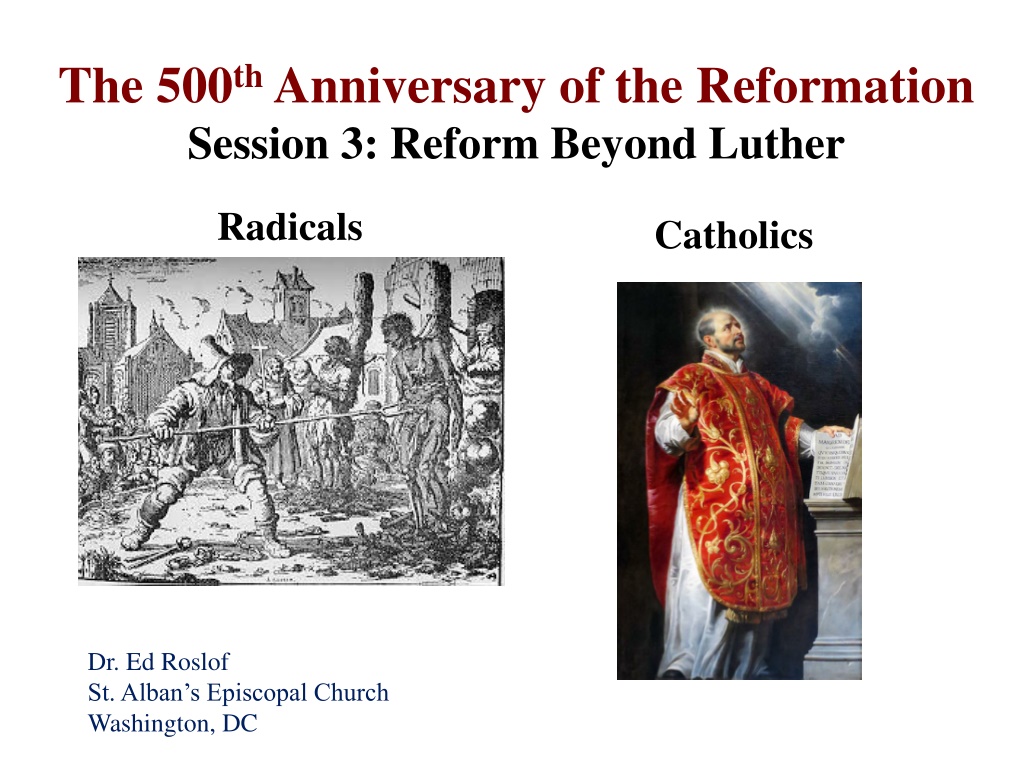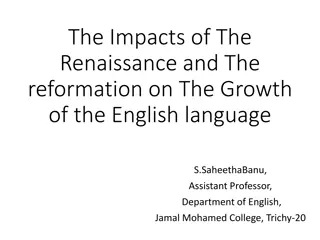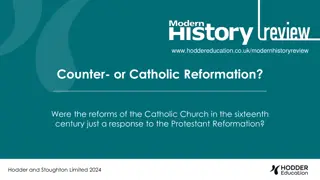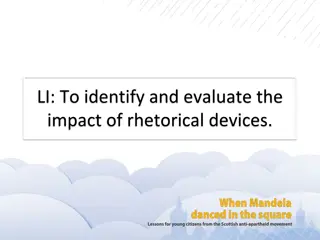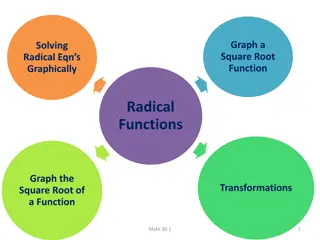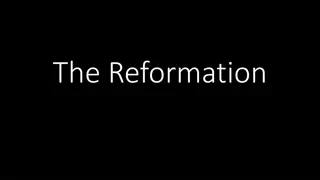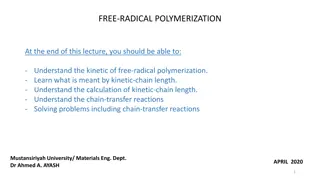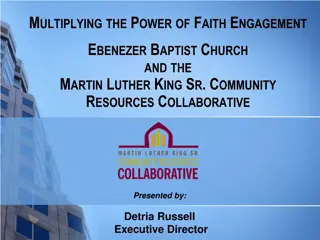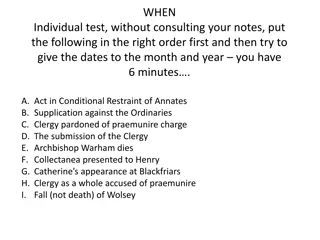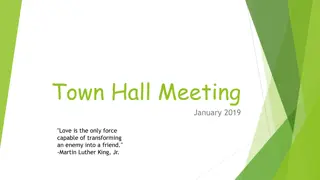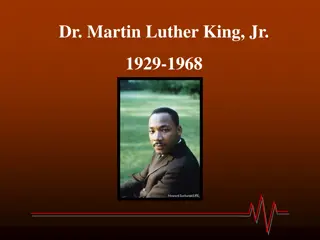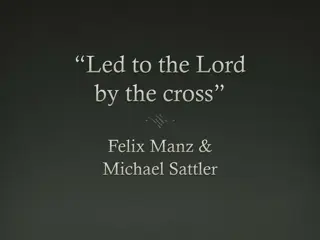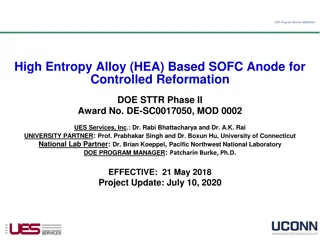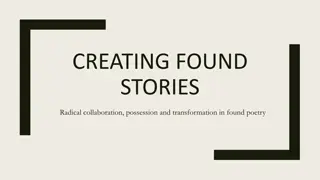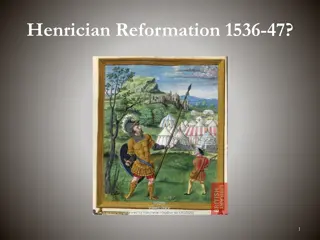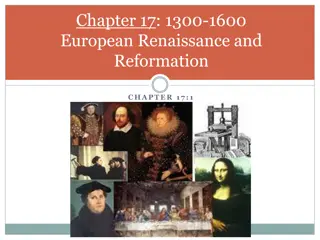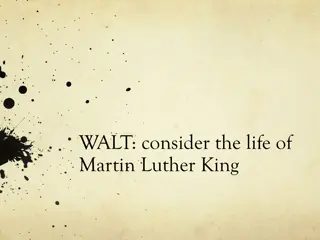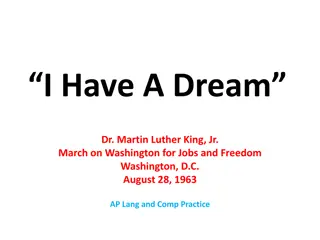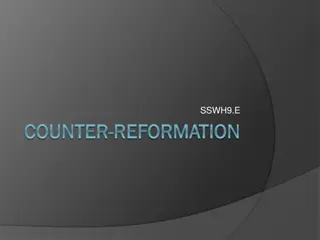The Reformation: Beyond Luther and the Radical Reformation
Explore the Reform movement beyond Martin Luther, delving into the radical beliefs of Anabaptists and the Magisterial Reformation led by Luther, Calvin, and Zwingli. Uncover the significant differences in theology, practices, and beliefs that shaped Christianity during this transformative period. Witness the evolution of the Church and the theological debates that forever altered Christian thought.
Download Presentation

Please find below an Image/Link to download the presentation.
The content on the website is provided AS IS for your information and personal use only. It may not be sold, licensed, or shared on other websites without obtaining consent from the author. Download presentation by click this link. If you encounter any issues during the download, it is possible that the publisher has removed the file from their server.
E N D
Presentation Transcript
The 500thAnniversary of the Reformation Session 3: Reform Beyond Luther Radicals Catholics Dr. Ed Roslof St. Alban s Episcopal Church Washington, DC
Recap of Luthers Evangelical Christianity: Simple, Personal 1. Sola fide Catholics: both faith and good deeds needed for salvation. Luther on reading Romans 1:17 ( The righteous shall live by faith. ): I felt as if I had been born again and had entered Paradise through wide-open gates. 2. Sola Scriptura Catholics: God reveals will to humans through Bible, councils, papal pronouncements. Luther: only the Bible is divinely inspired. 3. Priesthood of all believers Catholics: priests have special spiritual powers from Apostles, in sacraments Luther: all Christians have direct access to God through prayer. Priests are men called to care for spiritual needs of parishioners full time 4. Papal usurpation. Catholics: Pope is Vicar of Christ on earth. Luther: Popes had illegally seized position as head of Christianity. They were not even good priests. They were the Antichrist. 5. Sacraments Catholics: baptism, confirmation, Eucharist, marriage, ordination, penance, unction Luther: Eucharist and baptism
Martin Luther John Calvin Ulrich Zwingli Leaders of the Magisterial Reformation
The Radical Reformation Video introduction (thanks to Emo Phillips): We should all learn to love each other. Once I was in San Francisco, walking along the Golden Gate Bridge. And I saw this guy on the bridge about to jump. I thought I d try to stall him, detain him. I said, Don t jump! He said, Nobody loves me. I said, God loves you. Do you believe in God? ... Go to: https://www.youtube.com/watch?v=ANNX_XiuA78
Radical Reformation: Anabaptists Anabaptist theology: Church as a voluntary association of believers (community of saints) Believer s (re-)baptism [Felix Manz, Zurich, 1525] Return to apostolic practices and beliefs, including communal living and millenarianism Rejection of secular authority over church Theocracy in Munster, 1534-1535 Ongoing persecution, turn to pacifism
Catholic Response Council of Trent (1545-53) Called by Paul III Held in northern Italy 3 sessions, 5 popes No compromise with Protestantism Reformed Catholic doctrine and practice Tridentine Mass Society of Jesus Ignatius of Loyola (1491- 1556), Spiritual Exercises First followers included Francis Xavier Jesuit order founded 1539, ad maiorem Dei gloriam Reformed Catholicism from within shock troops of the Counter Reformation
Death of Luther, 1546 Luther s Death Mask, Market Church in Halle
Catholic Response Council of Trent (1545-53) Called by Paul III Held in northern Italy 3 sessions, 5 popes No compromise with Protestantism Reformed Catholic doctrine and practice Tridentine Mass Society of Jesus Ignatius of Loyola (1491- 1556), Spiritual Exercises First followers included Francis Xavier Jesuit order founded 1539, ad maiorem Dei gloriam Reformed Catholicism from within shock troops of the Counter Reformation
Final Session: November 26 Why does St. Alban s exist? The English Reformation Distinctive features of Anglicanism Origins of the Episcopal Church
